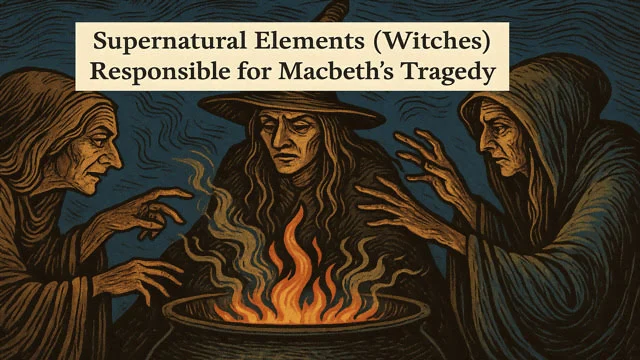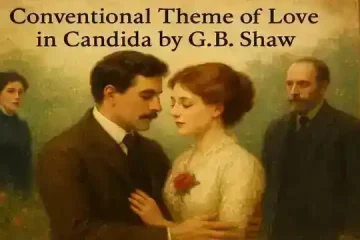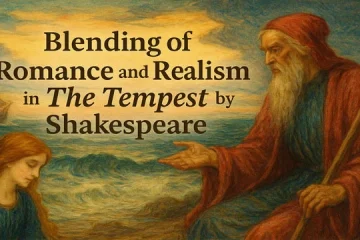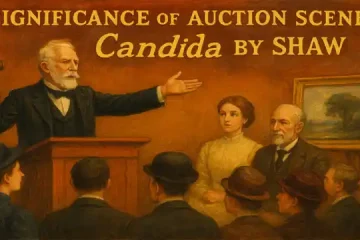Introduction:
Macbeth, like several of Shakespeare’s plays, contains supernatural figures in the witches and ghosts it introduces. These produce an atmosphere of fate and mystery. But the tragic action of Macbeth is not influenced by their presence. That action is the outcome of passion and emotions struggling in the hearts of its characters. It is the natural, not the supernatural force which shape and determine the course of events leading to the tragedy of the hero and the heroine of Macbeth. It is often imagined that Macbeth is influenced by the witches in his treacherous murder of Duncan and in his usurpation of the crown. Even if we imagine this, we cannot account for the many other crimes and misdeed in which the witches do not play even an apparent part.
Shakespeare’s Introducing Witches and their Nature:
Shakespeare introduces witches in the first scene not only to suggest their importance but their nature also. They appear in thunder, lightning or in rain. When battles create confusion they appear at desert places. Witches are associated with sin and evil. They do not like fair, noble and virtuous things. Their motives are opposite to human motives.
Frightening Appearance and Their Supernatural Powers:
The witches in Macbeth are not goddesses. They are rather old women, poor, ragged, skinny and hideous. They look wild and withered, different from creatures of the world. Their fingers are choppy and lips heavy. They are strange creatures with beards grown on their chins. When Banquo and Macbeth return from their battlefield, Banquo marks them:
“What are these?
So wither’d and so wild in their attire
That look not like the inhabitants O’ the earth.
And yet are on’t? Live you? or are you aught
That man may question? You seem to understand me,
By each at once her choppy finger laying
Upon her skinny lips: you should be women.
And yet your beards forbid me interpret
That you are so.”
They (witches) have received certain supernatural powers from evil spirits. They can raise storms, hails and bad weather. They are malicious and revengeful.
The Agents of Satan and Embodiments of Evil:
If the witches’ physical features are disgustingly horrible, their powers and activities are malignant and awe – inspiring. They are the agents of Satan, the instruments of darkness the embodiments of all that is evil in the universe. They take fiendish delight in preparing special charms and spells by using such horrid things as the limbs cut off from dead bodies, poisonous toads and snakes and the bodies of unbaptized children. They sing and dance around their fierce fire on which a cauldron is boiling. Banquo calls them “instruments of darkness” because they always appear in bad weather. They win people’s confidence in small matters in order to betray them in matters of great importance. They always appear when there is some turmoil in society, or there is a reversal of social values. They appear in the heath when the state of Scotland is in the state of turmoil and Duncan is betrayed by the Thane of Cawdor. To them “Fair is foul, and foul is fair.”
Great Impact of Witches’ Prophecies on Macbeth:
Though the influence of the prophecies of the witches on Macbeth is very great yet it is an influence and nothing more. There is no sign whatever to show that the actions of Macbeth were forced on him by the witches. The prophecies of the witches are presented simply as dangerous circumstances with which Macbeth has to deal. All that they do, is to reveal the future to Macbeth but they do it in such a manner as to stimulate the hungry ambition which in him already. This type of ambition is really a capacity for crime as soon as the opportunity is presented.
Macbeth is perfectly free in regard to them. The witches merely announce the events. No action is hinted by them. The idea of fulfilling the prophecy about his future kingship by murder is entirely Macbeth’s own.
The Impact of Their Prophecies on Banquo:
Though the Witches announced that Banquo’s sons would be kings, he was not moved whereas Macbeth was startled. Banquo asks Macbeth:
“Good sir, why do you start;
And seem to fear things that sound so fair?”
Banquo left everything to time whereas Macbeth tried to master the forces of fate and destiny as represented by the witches. Once he started on the path of crime, he could not retrace his steps.
Macbeth’s Firm Faith on the witches and His Consulting the Witches:
After Macduff’s flight and the escape of Banquo’s son, Macbeth consulted the witches on his own. He was told that he would be harmed by none of woman born, and would never be defeated till Birnam Wood would come to him. Since the earlier prophecies had come true, he did not doubt their words. He was rather pretty convinced that he was invincible. So he became callous and indifferent to the voice of his people. When Macduff told him in the battlefield that the former was not woman – born, Macbeth realised that he had been deceived by the witches.
The Witches’ Externalizing the Wicked thoughts in Banquo and Macbeth:
The prophecies made by the witches are to be taken merely as symbolic representations of thought and desired which slumbered in Macbeth’s breast. The witches themselves represent the evil which lies around Macbeth and aids his ambition. In this way, the witches externalize all that is wicked in Macbeth and Banquo.
The Witches’ Having Terrifying Power to Influence Human Nature and Soul:
Sources of Fear, Horror and Mystery:
The witches have terrifying power. Not only do they influence nature but they influence human souls also. They tempt man to evil deeds and call up the dead from their response in their graves. They are experts at equivocation, telling lies like truth so that men are misguided by their doubtful words. As Macbeth says:
“I begin to doubt
The equivocation of the friend
That lies like truth.”
And Banquo confirms earlier (what Macbeth learnt too late) the same in the lines:
“But it is strange,
And of ten times, to win us to our harms
The instrument of darkness tell us truth,
Win us with honest trifles, to betray us
Undeepest consequence.”
Other Forms of Supernatural – Ghost, Apparition and Hallucination:
(i) Ghost:
Macbeth gets Banquo murdered but in the party, he pretends a great love and respect for him. He makes a complaint that Banquo is not present in the party. Just then Banquo’s ghost appears and Macbeth is horrified limitlessly. The ghost disappears. Macbeth recovers his sense. Macbeth again makes a false chain of his love for Banquo and the ghost re-enters. Macbeth’s wits are lost.
(ii) Apparitions:
Being horrified of the ghost of Banquo, Macbeth surrenders to witches who present before him three apparitions which predict for Macbeth such strange things that he becomes careless of human powers. The first apparition is an armed head, the second, a bloody child and the third, a child crowned with a tree in his hand.
(iii) Hallucination:
Just before Duncan’s murder, Macbeth sees an air drawn dagger in his chamber. It leads him to Duncan’s room. When he tries to grasp it, he fails. After a while he sees some spots of blood on it. He thinks that his mind is overfilled with the thoughts of murder so he is troubled by such foul images created by imagination.




